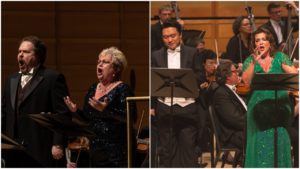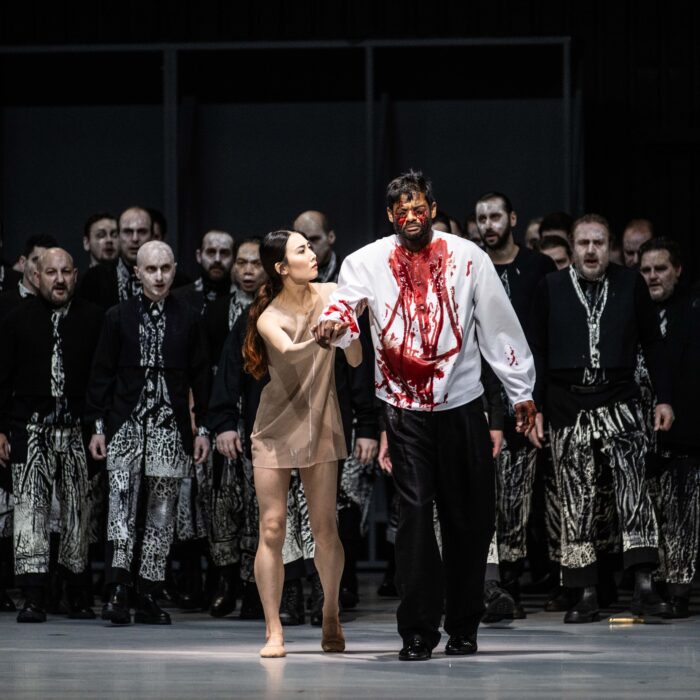
Maryland Lyric Opera 2019-20 Review: Il Tabarro / Cavalleria Rusticana
Mark Delevan Triumphs In Both Puccini & Mascagni
By Francisco Salazar(Credit: Courtesy of the Maryland Lyric Opera)
The Maryland Lyric Opera is entering its fifth season and, as a young company, it has been seeking out new ways to grow through presentations of some of the best works in the repertoire. On Sept. 14, 2019, the company opened with a concert performance of Puccini’s “Il Tabarro” and Mascagni’s “Cavalleria Rusticana.” Both works showcase different styles within the verismo repertoire, with this performance highlighting three main soloists.
And on this evening led by Louis Salemno, there was an undeniably standout performance.
A Dominating Force
During the evening two singers were asked to perform in both works. Mark Delevan was one of the two and he relished each work he took on.
In “Il tabarro” the baritone created a sympathetic portrayal of Michele. While he can sometimes be given a villainous quality as he does commit murder, this interpretation was one filled with pain and remorse. Delevan beautifully portrayed that with his singing, particularly in his duet with Giorgetta. This moment is perhaps the most potent of the evening as Michele asks Giorgetta to return to her and love him the way she used to. Delevan sang with a booming voice that shook with emotion as the line grew. There was pain in each line as he attempted to sway his Giorgetta back to him. His phrase “resta vicino a me” was initially sung with defeat and then as his repeated the line, he gave it anguish and nostalgia.
His subsequent aria “Nulla silenzio!” brought out torture in the character as he attempted to figure out Giorgetta’s lover. The voice grew in volume and increasingly rode over the agitated violin runs. “La Pace della Morte” was sung with such agitated character that one could understand Michele’s suffering and his fateful decision.
Delevan’s Alfio was the total opposite. Delevan gave his Alfio a snarl right from his first entrance that made this character arrogant. He sang “Il cavallo scalpita” with rhythmic precision and virtuosic fireworks. There was a dominating presence which was helped by the accented and authoritative high notes.
But he was able to give his Alfio some redeeming qualities as well, particularly in the duet with Santuzza. Delevan was very attentive to Susan Bullock throughout this sequence, and one saw Delevan’s face turn from arrogance to anger and pain in the process. His “Vendetta avro” was filled with fury and immediacy which was juxtaposed beautifully by Susan Bullock’s Santuzza which was full of desperation and remorse.
Double Duty
Like Delevan, Allegra de Vita performed in both works and created two distinct characters in a small period. While these roles are small, De Vita demonstrated that there are no small roles using each moment she had onstage to bring her presence to the scene.
As Frugola in “Il tabarro,” she was filled with vivid energy as she sang about her dream of living in the country and during her aria she brought a bright timbre. As Mama Lucia in “Cavalleria Rusticana,” that jovial spirit was gone and replaced by a more subdued somewhat somber character. While there are no arias in this role, De Vita gave gravitas to each of her recitatives and outbursts using a darker tone. It didn’t hurt that the mezzo was completely engaged in both roles as she interacted with each of her colleagues and reacted to their arias and texts vividly.
Il Tabarro
Puccini’s first opera of “Il Trittico” is perhaps one of the most demanding, particularly for its tenor. Luigi requires a tenor with heft and a solid upper range that can ride over an immense orchestra.
On this evening tenor, Yi Li struggled with the role. While his tenor might have a spinto timbre, it has a lightness that struggles and easily gets drowned by an orchestra as big as Puccini’s in this work. While he sang his first aria “Hai ben raggione” with immaculate phrasing, he struggled in the more heroic outbursts. As he entered the higher tessitura and was forced to ascend from the G to the high B Flat, his tone thinned out, making for a rather anti-climactic moment.
During his duet with soprano Jill Gardner, what should be a romantic blending of two voices also fell quite flat. The climactic build saw the tenor fall back in volume, allowing only Gardner’s voice to really be heard. And it didn’t get better as the final duet with “perché gli hai chiesto.”
While he was presently audible and sang with refreshing youth in the opening lines, the tenor’s voice started to sound strained as he ascended in the phrase “Noi tutti soli lonati dal mondo” which rose to a high A. Not yet the climactic moment in the duet, the tenor cut the note short. And when the passage repeated and Puccini asks the tenor to hold multiple Gs in a triplet phrases ascending to the high A, Li visibly struggled to hold his voice in the passagio. At the climatic high A which ascended with a grace note, Li skipped the appogiatura and quickly moved backed down to his middle voice. His performance could have been helped if the tenor would have at least seemed somewhat interactive with his stage partner but Li was more concentrated on his music.
In the role of Giorgetta Jill Gardner had a mixed evening. The soprano possesses a bright timbre that is not the most obvious choice for the role. But in this case, Gardner’s voice has a striking power that is perfect for the music and gives the role a youthfulness that is sometimes lacking in the darker dramatic voices.
On this evening Gardener used her voice to great effect particularly in the duet with Delavan’s Michele. The soprano’s evening started a bit mixed as she attempted to connect with Li in her great duet “E Bel altro il mio sogno.” The soprano’s lines were sung with a gorgeous legato line and soaring high notes. However, without someone to connect with, Gardner’s lines seemed disconnected from the entire piece. You could say the same thing with the subsequent duet “perché gli hai chiesto,” which is in many ways the soprano line is the support for the tenor.
The energy and the acting that Gardner displayed was finally put to best use in her duet with Michele. Here we finally got to see her get fully involved in the drama interacting with Delavan and reacting to each of his lines. Gardner sang with intensity, whether it was in her recitatives or in her legato lines and finally let out the full power of her voice. It is the moment that the audience finally got to see the suffering and confusion within her character and the standout of her performance.
As the lovers, Mauricio Miranda and Suzanne Karpov showed youthful and bright voices that added to the solid ensemble.
Cavalleria Rusticana
While “Il Tabarro” sometimes lacked in vocal heft, Mascagni’s masterpiece was the complete opposite. The Maryland Lyric Opera cast the work to perfection with three distinct voices that led to a performance full of intensity and raw emotion.
Susan Bullock led the charge, dominating each scene she was present in with her raw and communicative voice. While she doesn’t have the Italianate timbre or warmth one expects for this repertoire, the soprano easily brings the required intensity to the role.
I was particularly struck by her way with the text. Regardless of whether she was singing a lyrical passage or a declamatory verse, Bullock always emphasized the consonant sounds adding to the dramatic moment of the aria or duet. One particular moment was the declamation “a te la mala Pasqua” as she hesitantly started the phrase before unleashing what resembled someone screaming the words. It was quite powerful and gave us a sense of the anger and pain in Santuzza.
Bullock’s vocal intentions didn’t always come through particularly in “Voi lo sapete o mama,” which calls for long legato lines. The soprano’s icy tone didn’t always connect and the soaring, climactic phrases that end the aria did not quite create the impassioned verismo quality.
During the duets, however, Bullock had two stage partners that embraced the soprano’s energy. In the first duet with Turiddu, she embraced the passionate outbreaks and the higher passages, singing with freedom and desperation. In her duet with Alfio she began with a bit more reserved tone, but as the duet developed, that same desperation was unleashed and Bullock produced emotional power through raw sound.
Jonathan Burton’s performance as Turiddu could be defined in two words: passionate youthfulness. From the very beginning, Burton’s intention was clear – Turiddu was all impulse and emotion. Nothing more. For a concert performance, this was enough and it was effective. Burton swelled through the vocal lines, extended notes; his high notes gleamed powerfully. His opening serenade was sung with a bright timbre and every time Burton could, he would hold out a note. That youthfulness was also on display in the drinking song. Here Burton was playful with the text as he deployed the faster passages and then showed some virtuosic fireworks as he entered into the higher tessitura; again he sang the higher notes with liberty extending them as much as he could.
But the real showstopper of his performance was his “O mamma quel vino e generoso.” Here Burton added vocal layers to his portrayal, allowing Turiddu to display a sense of maturity and wisdom. Every line grew in intensity until he got ot the climatic recapitulation that really emphasized the lamenting quality of the aria. The final “addio” was powerful and at the same time heartbreaking.
As Lola, Joowon Chae showcased a beautiful mezzo that one hopes to hear in something more extensive.
The Leader
Conducting the Maryland Lyric Orchestra, Louis Salemno gave a solid reading of both scores, emphasizing their raw intensity as well as their subtle elegance. “Il tabarro” was striking in how the ensemble was able to create the feeling of flowing at the start, while in “Cavalleria” the orchestra was but a whisper that crescendoing in an organic shimmer.
Also worth noting is how Salemno built each climax in the performance. The orchestra would start with a pianissimo sound and would slowly build the line to the fortissimo, whether it was in an aria or duet or simply a choral passage. This allowed the music to flow organically and gave the climactic moments the dramatic impact. This was particularly evident in the Michele-Guiorgetta due tin “Il tabarro” and in Turiddu’s aria in “Cavalleria Rusticana.”
It should also be noted that Salemno handled the dynamics of the pieces with expertise, never covering the singers. He also followed his soloists with precision, allowing them the bandwidth to stretch the tempi as the drama required.
There were some moments however, especially in “Cavalleria Rusticana,” that didn’t have the cohesion representative of the rest of the night. The intermezzo sometimes felt like it was a violin solo as the concertmaster sometimes overplayed and was the only thing heard. The horns also had some rough entrances at the beginning of the work, particularly during the choral passages.
The chorus was also led superbly, particularly in the Regina Coeli, which was sung with an imposing quality. The drinking song was also fantastically performed by the ensemble.
Overall this was a superb evening that really showed the potential of a growing company and two star turns from Mark Delevan.


